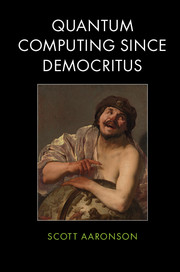Book contents
- Frontmatter
- Dedication
- Contents
- Preface
- Acknowledgments
- 1 Atoms and the void
- 2 Sets
- 3 Gödel, Turing, and friends
- 4 Minds and machines
- 5 Paleocomplexity
- 6 P, NP, and friends
- 7 Randomness
- 8 Crypto
- 9 Quantum
- 10 Quantum computing
- 11 Penrose
- 12 Decoherence and hidden variables
- 13 Proofs
- 14 How big are quantum states?
- 15 Skepticism of quantum computing
- 16 Learning
- 17 Interactive proofs, circuit lower bounds, and more
- 18 Fun with the Anthropic Principle1
- 19 Free will
- 20 Time travel
- 21 Cosmology and complexity
- 22 Ask me anything
- Index
- References
10 - Quantum computing
Published online by Cambridge University Press: 05 April 2013
- Frontmatter
- Dedication
- Contents
- Preface
- Acknowledgments
- 1 Atoms and the void
- 2 Sets
- 3 Gödel, Turing, and friends
- 4 Minds and machines
- 5 Paleocomplexity
- 6 P, NP, and friends
- 7 Randomness
- 8 Crypto
- 9 Quantum
- 10 Quantum computing
- 11 Penrose
- 12 Decoherence and hidden variables
- 13 Proofs
- 14 How big are quantum states?
- 15 Skepticism of quantum computing
- 16 Learning
- 17 Interactive proofs, circuit lower bounds, and more
- 18 Fun with the Anthropic Principle1
- 19 Free will
- 20 Time travel
- 21 Cosmology and complexity
- 22 Ask me anything
- Index
- References
Summary
Alright, so now we've got this beautiful theory of quantum mechanics, and the possibly-even-more-beautiful theory of computational complexity. Clearly, with two theories this beautiful, you can't just let them stay single – you have to set them up, see if they hit it off, etc.
And that brings us to the class BQP: Bounded-Error Quantum Polynomial-Time. We talked in Chapter 7 about BPP, or Bounded-Error Probabilistic Polynomial-Time. Informally, BPP is the class of computational problems that are efficiently solvable in the physical world if classical physics is true. Now we ask, what problems are efficiently solvable in the physical world if (as seems more likely) quantum physics is true?
To me it’s sort of astounding that it took until the 1990s for anyone to really seriously ask this question, given that all the tools for asking it were in place by the 1960s or even earlier. It makes you wonder, what similarly obvious questions are there today that no one’s asking?
- Type
- Chapter
- Information
- Quantum Computing since Democritus , pp. 132 - 149Publisher: Cambridge University PressPrint publication year: 2013



